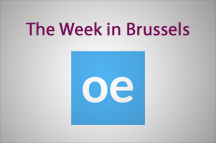 Monday
Monday
The European Commission didn’t take long to start 2018 by doing what it has been doing many times before: asking for more money. In a speech, Commission President Juncker called on Member States to lift the existing cap of one per cent of GDP on the EU’s common budget.
In a comment for Politico, I’ve responded, saying that for the sake of its own reputation, “Brussels should be slimming down and reforming its budget, not hiking up the price tag”, noting “The best things about the EU are inexpensive: To strike trade deals with non-member states, or to weed out protectionist national rules, for example, we need the top EU Court in Luxembourg and the highly qualified officials in the Commission’s competition department — who do, of course, deserve a good salary — and that’s about it. The worst things — excessive spending programs; burdensome overregulation — all seem to cost a lot of money. But for the EU the biggest damage isn’t only financial — it’s reputational."
Tuesday
Two cabinet reshuffles happened in Europe this week: the first one on Monday and Tuesday in the UK, where key members of Prime Minister Theresa May’s cabinet remained in office, including Brexit Secretary David Davis and Foreign Secretary Boris Johnson. Important for Brexit was the appointment of former Europe Minister David Lidington as the new Minister for the Cabinet. He’s expected to play a big role in the upcoming negotiations on a transition period after March 2019, when the UK exits the EU, and the trade negotiations.
The other important reshuffle happened in Poland, where the leader of the ruling PiS party, who’s seen as the country’s most powerful man, had already politically appointed Mateusz Morawiecki as the new Prime Minister last year. After putting in place this more moderate figure, a number of Ministers who weren’t on good terms with the EU were replaced.
The reshuffle came ahead of PM Morawiecki’s meeting with European Commission President Jean-Claude Juncker on Tuesday and is widely seen as a welcome attempt by the Polish ruling party to mend relations with Brussels.
Wednesday
This week saw the Brexit circus kickstart again. After EU Brexit negotiator Michel Barnier had already been meeting former UKIP leader Nigel Farage on Monday, he welcomed a number of other people who had been campaigning for leave on Wednesday. A welcome gesture. Eurosceptic MEP Steven Woolfe handed Mr. Barnier a basket with delicious products from Britain including some British cheddar, wine and gin, telling him that “we intend to stress the importance that an all-encompassing free trade deal is in the best interests for the people of the UK and the EU. If this is prevented, the UK will have no option but to leave without a deal and trade under WTO terms.” I agree with him, although I think Britain should only take this option which is very damaging for both sides when indeed the EU would refuse or be unable to conclude a trade deal with the UK. A few years are needed to do that, so the UK will need to be patient.
.jpg) Thursday
Thursday
On Thursday, officials from the EU27 met for a seminar to brainstorm about the future relationship with the UK, discussing the governance of rules and a possible role for the EU Court of Justice. Barnier said in a speech the EU will accept ‘equivalence’ of some UK rules in financial services after Brexit, but won’t offer full passporting rights. Bloomberg cited unnamed German officials from “two key government departments in Berlin” who’ve said that Germany will only agree to include financial services in a UK-EU free trade agreement if the UK continues to make substantial payments into the EU budget and adheres to EU law. We should always very much keep in mind this is a starting position: the EU always tends to ask for a lot more than it knows it will get.
Friday
As Bulgaria is taking up the rotating EU Presidency during the first half of this year, its Prime Minister Boyko Borisov said that a vote on sanctions against Poland over its rule of law issues would give the EU "sleepless nights" and should be avoided, adding that such a discussion between member states "would set a very dangerous precedent."
On the one hand, the EU is right to monitor the rule of law, also because of the importance of its task to safeguard fair competition. On the other, however, the EU has no teeth, so if the dispute escalates, people in Poland may rally around the flag. This could ultimately strengthen support for what Hungarian PM Orban has dubbed “illiberal democracy”. Still, oddly, at the moment in Poland, the governing PiS party is enjoying record popularity (with some polls even indicating 50% of voters back them), while at the same time 92% of Polish support membership of the EU. It looks like the Polish prefer a loose free trade EU and not a “political EU”, with transfers and Brussels interventions, as support for Eurozone membership is at record lows.














